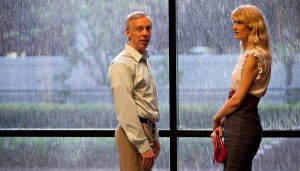Enlightened, Created and Written by White ’92, Premieres on HBO

Mike White ’92 has created (with actress Laura Dern) a new comedy-drama for HBO, Enlightened, which premiered on HBO in early October. White also wrote all 10 episodes for the first season, and directed two of them. Other directors include co-executive producer Miguel Arteta ’89, Jonathan Demme, Phil Morrison, and Nicole Holofcener.
Enlightened tells the story of Amy Jellicoe, played by Dern, a self-destructive executive at a large company who has a hugely dramatic meltdown in her office and is sent to a New Age treatment center in Hawaii, where she swims with sea turtles and heals. She returns to her former company ready to change herself and the world but her workplace reassigns her to the basement with a bunch of misfits who are destined for obscurity. White plays one of Amy’s co-workers.
In his review in The Los Angeles Times, Robert Lloyd said that Enlightened is “the most interesting and ambitious series of the fall season.”
In The New York Times review, Alessandra Stanley said: “It’s a funny, sardonic premise, but Enlightened is not just one big joke at the expense of crystal-carrying California narcissists. Comedy thrives on exaggeration, so it’s a credit to the show’s creator, Mike White, that Enlightened isn’t an entirely sarcastic title. The series embraces the absurdities of its subject with enough compassion to avoid outright parody.”
The Wall Street Journal’s Michael Judge praised the show, writing: “This isn’t just the story of one woman’s search for relevance or power in a man’s world; it’s the story of one human being’s search for meaning, one soul’s search for redemption. How many lower circles of hell will Amy and those she hopes to save descend into before they are all truly enlightened? God knows. But it certainly will be fun finding out.”
White was profiled by Carina Chocano in The New York Times on October 7, 2011. Chicano said: “As a writer, White is intrigued by people in crisis and by the way in which they seem to draw the people around them into a reluctant dance of identification and rejection.”
Chicano continued: “Because White’s film characters tend to elicit existential discomfort, he often gets pegged as a satirist. ‘I don’t know,’ he said. ‘I think I’m more of an absurdist than a satirist. I think I’m more of a — humanist? I hate to say it!’ This made him laugh. But it’s an accurate description, in the sense that he returns again and again to the subject of what it’s like and what it means to be human — to try to do the right thing, to screw up, to feel bad, to try again. This is perhaps the most salient quality in his body of work.”

